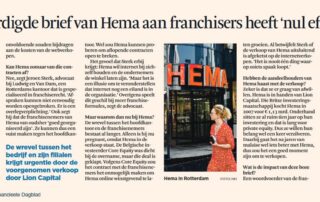(Im)decent behaviour
In practice, situations occur in which a franchisor is confronted with conduct by one or more franchisees that does not fall directly under the scope of the franchise agreement. This includes matters that do not directly relate to what has been agreed in the contract, such as the manner in which fellow franchisees and/or the franchisor are treated, making statements to third parties, such as the press, about the concept and the manner in which of cooperation, the way in which external relations of the franchise organization are dealt with, and, based on some practical examples, the way in which conflicts are handled within the organisation. The franchise agreement often contains a dispute settlement procedure, but this generally only contains formal provisions regarding the manner in which a dispute must be brought before and before which body this must be done.
In practice, it sometimes happens that when franchisees have a dispute with their franchisor on an individual basis, they try to find allies for their cause among fellow franchisees. In some cases, this leads to the establishment of an interest group. There is nothing against this in itself, of course, but if this takes the form of deliberately sabotaging the cooperation by giving the franchise organization a bad name, whether or not via the press, or by trying to charge fellow franchisees against the franchisor, such conduct may be unlawful and, as such, grounds for rescinding the franchise agreement and seeking damages from the affected franchisee(s). The reverse is also possible: a franchisor can also behave towards one or more of its franchisees in such a way that this gives rise to unlawfulness.
It is not for nothing that the European Code of Honor on Franchising stipulates that, in short, parties should treat each other with good will, especially in the event of conflicts. If that benevolence is not exercised, the limits of decency may come into view, even though the parties in a franchise relationship have not made any agreements with each other about this. If these limits are exceeded, as can be seen from the foregoing, this can have serious and far-reaching consequences.
Ludwig & Van Dam franchise attorneys, franchise legal advice

Other messages
Late notification that no franchise agreement will be concluded
On April 11, 2017, EQLI:NL:GHARL:2017:3104, the Amsterdam-Leeuwarden Court of Appeal not only assessed the question of whether the negotiations on a franchise agreement to be concluded
Want to get rid of your franchise agreement in the meantime?
Franchise agreements are usually concluded for a longer period of time. How do you break open a franchise agreement?
HEMA in conflict with franchisees about e-commerce agreements
On 18 July 2018, the District Court of Amsterdam, ECLI:NL:RBAMS:2018:5098, rendered a judgment in proceedings on the merits in which the franchisees were largely ruled in favor of e-commerce.
mr. J. Sterk about HEMA conflict in the FD 18 July 2018
mr. J. Sterk about HEMA conflict in the FD.
Column Franchise+ – “Legal Franchise Statistics 2018”
The Legal Franchise Statistics have been compiled for 10 years by Ludwig & Van Dam attorneys on the basis of all published judgments of judges.
Franchisor prohibits opening (franchise) company
A franchisor applied for interim measures to prohibit a franchisee from opening a franchisee's business.






